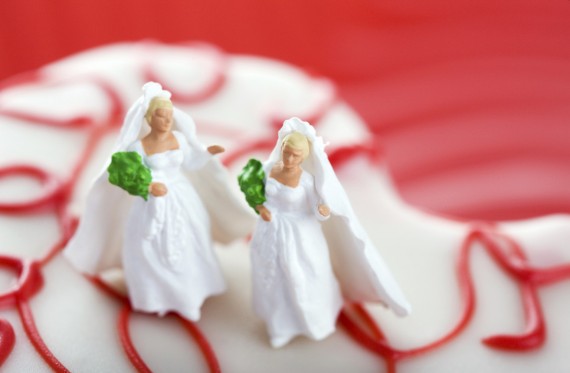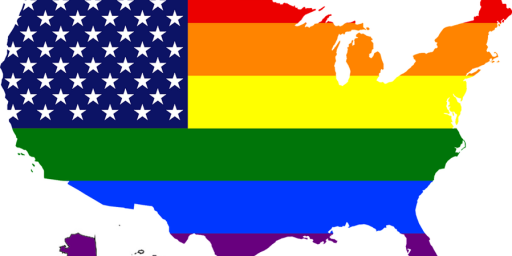Irish Voters To Vote On Legalizing Same-Sex Marriage On May 22nd
In just over a week, Ireland seems set to become the first nation in the world to legalize same-sex marriage via referendum:
DUBLIN — In less than two weeks, the Republic of Ireland could become the first country in the world to allow same-sex couples to marry thanks to a popular vote, boosting the marriage-equality movement, which has swept across western Europe.
The latest poll shows 78% of voters in favor of passing the amendment on May 22. That is a staggering number, considering that Irish voters only approved divorce in 1995, and with a margin of less than 1%. It also reflects how diminished the power of the Catholic Church has become over the past 20 years, thanks in large part to devastating sexual abuse scandals that have undermined its moral authority. Catholic bishops have come under fire from some conservative laypeople for not doing enough to stop the referendum, while a few priests have even come out in support of it.
After 20 years of fights in the U.S. and around the world, this is the first time LGBT rights activists have locked horns with conservatives in a battle for the direct support of an entire nation. Several eastern European countries have held referendums to bar same-sex couples from marrying, but Ireland is the first country to ask its electorate to vote on whether to establish marriage equality. A win would counter the criticism from conservatives that marriage equality has been imposed by elites over the will of the people. But a defeat could embolden a growing movement in eastern Europe that wants to enact constitutional bans against marriage rights for same-sex couples.
Paradoxically, the high poll numbers are making Yes campaigners even more nervous. Irish voters have a history of abandoning proposed constitutional changes in the final days of the campaign. And the shadow of California’s Proposition 8 — when voters rejected marriage equality in the state in 2008 after a win seemed likely — looms large.
“Look at how Prop 8 happened — Prop 8 was a slam dunk [for LGBT rights supporters] until the result came in and it turned out it wasn’t,” said Brian Sheehan, co-director of Yes Equality, the campaign group created to get out the Yes vote. The fact that pollsters comprehensively failed to predict the outcome of last week’s general election in the United Kingdom hasn’t boosted their confidence either.
Lampposts across Ireland are plastered with posters representing both sides. The No side says it’s printed around 10,000 posters in pink and blue with pictures of babies alongside slogans like “children deserve a mother and father.” Brightly colored signs from the Yes campaign urge people to vote Yes for “a more equal Ireland” and “because marriage matters.” The version in Gaelic translates to “lend me your hand,” a phrase that can both mean asking for help and someone’s hand in marr
Lampposts across Ireland are plastered with posters representing both sides. The No side says it’s printed around 10,000 posters in pink and blue with pictures of babies alongside slogans like “children deserve a mother and father.” Brightly colored signs from the Yes campaign urge people to vote Yes for “a more equal Ireland” and “because marriage matters.” The version in Gaelic translates to “lend me your hand,” a phrase that can both mean asking for help and someone’s hand in marriage.
The Yes campaign has had the upper hand in the debate for months. Backed by every one of Ireland’s political parties, it has been running a bus tour to generate support for the referendum that was recently joined by Ireland’s head of government, Taoiseach Enda Kenny. The Yes campaign has also racked up an impressive list of endorsements from celebrities and athletes, including actors Colin Farrell and Chris O’Dowd, the musician Hozier, and the former captain of the country’s rugby team Brian O’Driscoll. Yes Equality is also running a canvassing operation that hopes to knock on all 1.8 million doors in Ireland.
Given the fact that Ireland is one of the most Catholic nations in Europe, and that the Church has previously been successful in pushing back against efforts to liberalize Irish laws in other areas such as abortion, this is somewhat of a surprise. And, of course, the forces opposed to the referendum are not sitting back in the closing ten days of the campaign:
The tactics of the No campaign — which is built around the argument that children will be harmed if same-sex couples are allowed to wed — look disturbingly familiar for American LGBT rights advocates, who are watching the Irish vote carefully. This is exactly the kind of messaging that ate away at support for marriage equality in the Proposition 8 campaign, and they believe it has the fingerprints of the conservative group that pulled off that upset victory, the National Organization for Marriage (NOM).
“When the other side filed [to name their group] as Mothers and Fathers Matter, that was an instant signal to me that their messaging is 100% from the playbook of NOM and the U.S.,” said Thalia Zepatos, director of research and messaging for Freedom to Marry, an organization established in 2003 to counter the wave of ballot measures in U.S. states to ban marriage equality. Like NOM, she said, Mothers and Fathers Matter was using a “drumbeat of fear-based messaging [about children by the No campaign that] brings the numbers lower and lower and lower.”
The Irish campaign “reminds me more of Prop 8 than any other campaign I’ve seen since then,” said Zepatos.
The No side denies that it is borrowing tactics from California, saying it’s learned more from campaigns in eastern European countries like Slovenia in 2012 or Croatia in 2013, where referendums were passed curtailing partnership rights for same-sex couples.
“We wouldn’t be taking too many more lessons from Prop 8 than from elsewhere,” said David Quinn, head of the Iona Institute and adviser to Mothers and Fathers Matter. Quinn, who also writes a regular column in the Irish Independent newspaper, is widely regarded as the savviest campaigner on the No side.
(…)
But the No camp has gotten some input from veterans of the California campaign and other marriage fights abroad. Frank Schubert, the conservative political consultant credited with the Proposition 8 victory, told BuzzFeed News before an NOM rally in Washington earlier this month that he has sent private polling, focus-group work, and other messaging guidance to activists on the No side. NOM President Brian Brown also said he had “talked a lot” to Quinn periodically over the past few years, though they hadn’t communicated in over a year.
It’s hard to say where this campaign is going to go. The poll showing 78% support for marriage equality is encouraging, but it is also the only poll that has been taken so far since the campaign period began so it’s unclear whether its an accurate measure of the state of the electorate. Additionally, the outcome of the recent British General Election in a manner that was wildly out of sync with pre-election polling should probably be a caveat about relying upon polls until we have a better idea of where the British pollsters may have gone wrong, Nonetheless, this will be one worth paying attention to over the next two weeks.







You strongly overestimate the degree to which Ireland remains Catholic, and the degree of respect for and adherence to the Church, given the revelations over the last twenty years about the widespread child abuse and rape, and the cover-up thereof, engaged in by the priests and the hierarchy. There are millions of Irish who now regard the Church as more akin to a massive criminal cartel.
@Rafer Janders:
This is a fair point.
Yah, I was going to echo what Rafer says. Ireland WAS one of the most Catholic nations in Europe, but IIRC the number of Irish who identify as Catholic has dropped considerably.